Exploring the therapeutic potential of lipid-based nanoparticles in the management of oral squamous cell carcinoma
Oral squamous cell carcinoma (OSCC) is a highly malignant and invasive tumor with significant mortality and morbidity. Current treatment modalities such as surgery, radiotherapy, and chemotherapy en
[...] Read more.
Oral squamous cell carcinoma (OSCC) is a highly malignant and invasive tumor with significant mortality and morbidity. Current treatment modalities such as surgery, radiotherapy, and chemotherapy encounter significant limitations, such as poor targeting, systemic toxicity, and drug resistance. There is an urgent need for novel therapeutic strategies that offer targeted delivery, enhanced efficacy, and reduced side effects. The advent of lipid-based nanoparticles (LNPs) offers a promising tool for OSCC therapy, potentially overcoming the limitations of current therapeutic approaches. LNPs are composed of biodegradable and biocompatible lipids, which minimize the risk of toxicity and adverse effects. LNPs can encapsulate hydrophobic drugs, improving their solubility and stability in the biological environment, thereby enhancing their bioavailability. LNPs demonstrate significantly higher ability to encapsulate lipophilic drugs than other nanoparticle types. LNPs offer excellent storage stability, minimal drug leakage, and controlled drug release, making them highly effective nanoplatforms for the delivery of chemotherapeutic agents. Additionally, LNPs can be modified by complexing them with specific target ligands on their surface. This surface modification allows the active targeting of LNPs to the tumors in addition to the passive targeting mechanism. Furthermore, the PEGylation of LNPs improves their hydrophilicity and enhances their biological half-life by reducing clearance by the reticuloendothelial system. This review aims to discuss current treatment approaches and their limitations, as well as recent advancements in LNPs for better management of OSCC.
Anis Ahmad Chaudhary ... Md. Rizwanullah
View:509
Download:21
Times Cited: 0
Oral squamous cell carcinoma (OSCC) is a highly malignant and invasive tumor with significant mortality and morbidity. Current treatment modalities such as surgery, radiotherapy, and chemotherapy encounter significant limitations, such as poor targeting, systemic toxicity, and drug resistance. There is an urgent need for novel therapeutic strategies that offer targeted delivery, enhanced efficacy, and reduced side effects. The advent of lipid-based nanoparticles (LNPs) offers a promising tool for OSCC therapy, potentially overcoming the limitations of current therapeutic approaches. LNPs are composed of biodegradable and biocompatible lipids, which minimize the risk of toxicity and adverse effects. LNPs can encapsulate hydrophobic drugs, improving their solubility and stability in the biological environment, thereby enhancing their bioavailability. LNPs demonstrate significantly higher ability to encapsulate lipophilic drugs than other nanoparticle types. LNPs offer excellent storage stability, minimal drug leakage, and controlled drug release, making them highly effective nanoplatforms for the delivery of chemotherapeutic agents. Additionally, LNPs can be modified by complexing them with specific target ligands on their surface. This surface modification allows the active targeting of LNPs to the tumors in addition to the passive targeting mechanism. Furthermore, the PEGylation of LNPs improves their hydrophilicity and enhances their biological half-life by reducing clearance by the reticuloendothelial system. This review aims to discuss current treatment approaches and their limitations, as well as recent advancements in LNPs for better management of OSCC.
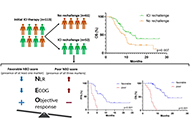 Predictive markers of response to immune checkpoint inhibitor rechallenge in metastatic non-small cell lung cancerOpen AccessOriginal ArticleAim: The present study aims to evaluate the efficacy of rechallenge with immune checkpoint inhibitors (ICIs) compared to chemotherapy and the predictive role of clinical parameters in non-small c [...] Read more.Aram A. Musaelyan ... Sergey V. OrlovPublished: October 18, 2024 Explor Target Antitumor Ther. 2024;5:1271–1288
Predictive markers of response to immune checkpoint inhibitor rechallenge in metastatic non-small cell lung cancerOpen AccessOriginal ArticleAim: The present study aims to evaluate the efficacy of rechallenge with immune checkpoint inhibitors (ICIs) compared to chemotherapy and the predictive role of clinical parameters in non-small c [...] Read more.Aram A. Musaelyan ... Sergey V. OrlovPublished: October 18, 2024 Explor Target Antitumor Ther. 2024;5:1271–1288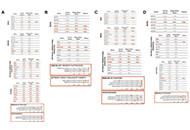 Upper tract urothelial cancer (UTUC) genomic profiling and correlation regarding benefit of platinum-based chemotherapyOpen AccessCase ReportUpper tract urothelial cancer (UTUC) are rare subsets of urothelial cancer, which typically present with more aggressive course. Molecular markers stratifying urothelial tumors as luminal subtype an [...] Read more.Min Woo Hwang ... Jeanny B. Aragon-ChingPublished: October 17, 2024 Explor Target Antitumor Ther. 2024;5:1261–1270
Upper tract urothelial cancer (UTUC) genomic profiling and correlation regarding benefit of platinum-based chemotherapyOpen AccessCase ReportUpper tract urothelial cancer (UTUC) are rare subsets of urothelial cancer, which typically present with more aggressive course. Molecular markers stratifying urothelial tumors as luminal subtype an [...] Read more.Min Woo Hwang ... Jeanny B. Aragon-ChingPublished: October 17, 2024 Explor Target Antitumor Ther. 2024;5:1261–1270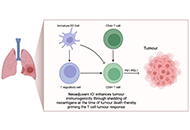 Evidence for the evolving role of neoadjuvant and perioperative immunotherapy in resectable non-small cell lung cancerOpen AccessReviewThe treatment of early-stage non-small cell lung cancer (NSCLC) is becoming increasingly complex. Standard of care management for the past decade has been adjuvant chemotherapy following curative in [...] Read more.Thomas Hansen ... Udit NindraPublished: September 29, 2024 Explor Target Antitumor Ther. 2024;5:1247–1260
Evidence for the evolving role of neoadjuvant and perioperative immunotherapy in resectable non-small cell lung cancerOpen AccessReviewThe treatment of early-stage non-small cell lung cancer (NSCLC) is becoming increasingly complex. Standard of care management for the past decade has been adjuvant chemotherapy following curative in [...] Read more.Thomas Hansen ... Udit NindraPublished: September 29, 2024 Explor Target Antitumor Ther. 2024;5:1247–1260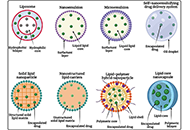 Exploring the therapeutic potential of lipid-based nanoparticles in the management of oral squamous cell carcinomaOpen AccessReviewOral squamous cell carcinoma (OSCC) is a highly malignant and invasive tumor with significant mortality and morbidity. Current treatment modalities such as surgery, radiotherapy, and chemotherapy en [...] Read more.Anis Ahmad Chaudhary ... Md. RizwanullahPublished: September 29, 2024 Explor Target Antitumor Ther. 2024;5:1223–1246
Exploring the therapeutic potential of lipid-based nanoparticles in the management of oral squamous cell carcinomaOpen AccessReviewOral squamous cell carcinoma (OSCC) is a highly malignant and invasive tumor with significant mortality and morbidity. Current treatment modalities such as surgery, radiotherapy, and chemotherapy en [...] Read more.Anis Ahmad Chaudhary ... Md. RizwanullahPublished: September 29, 2024 Explor Target Antitumor Ther. 2024;5:1223–1246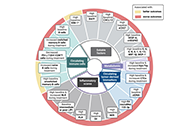 Blood-based circulating biomarkers for prediction of immune-checkpoint inhibitors efficacy in renal cell carcinomaOpen AccessReviewImmune checkpoint inhibitors (ICI)-based combinations have become the standard first-line treatment for advanced clear cell renal cell carcinoma (ccRCC). Despite significant improvements in survival [...] Read more.Loubna Omri ... Lucía Carril-AjuriaPublished: September 20, 2024 Explor Target Antitumor Ther. 2024;5:1199–1222
Blood-based circulating biomarkers for prediction of immune-checkpoint inhibitors efficacy in renal cell carcinomaOpen AccessReviewImmune checkpoint inhibitors (ICI)-based combinations have become the standard first-line treatment for advanced clear cell renal cell carcinoma (ccRCC). Despite significant improvements in survival [...] Read more.Loubna Omri ... Lucía Carril-AjuriaPublished: September 20, 2024 Explor Target Antitumor Ther. 2024;5:1199–1222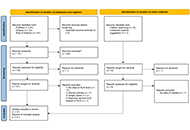 Diagnostic and prognostic role of NLR in testicular cancerOpen AccessSystematic ReviewBackground: To summarize the results of available studies for investigating the role of neutrophil to lymphocyte ratio (NLR) in testicular cancer (tCa). Methods: The search was conducted on [...] Read more.Shirin Sarejloo ... Brandon Lucke-WoldPublished: September 19, 2024 Explor Target Antitumor Ther. 2024;5:1177–1198
Diagnostic and prognostic role of NLR in testicular cancerOpen AccessSystematic ReviewBackground: To summarize the results of available studies for investigating the role of neutrophil to lymphocyte ratio (NLR) in testicular cancer (tCa). Methods: The search was conducted on [...] Read more.Shirin Sarejloo ... Brandon Lucke-WoldPublished: September 19, 2024 Explor Target Antitumor Ther. 2024;5:1177–1198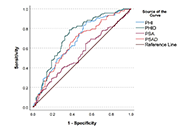 Diagnostic utility of prostate health index density prior to MRI-ultrasound fusion targeted biopsyOpen AccessOriginal ArticleAim: Prostate biopsy can be prone to complications and thus should be avoided when unnecessary. Although the combination of magnetic resonance imaging (MRI), the prostate health index (PHI), and [...] Read more.Benjamin H. Press ... Preston C. SprenklePublished: September 13, 2024 Explor Target Antitumor Ther. 2024;5:1168–1176
Diagnostic utility of prostate health index density prior to MRI-ultrasound fusion targeted biopsyOpen AccessOriginal ArticleAim: Prostate biopsy can be prone to complications and thus should be avoided when unnecessary. Although the combination of magnetic resonance imaging (MRI), the prostate health index (PHI), and [...] Read more.Benjamin H. Press ... Preston C. SprenklePublished: September 13, 2024 Explor Target Antitumor Ther. 2024;5:1168–1176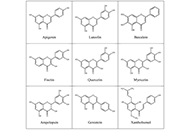 GPCRs as targets for flavonoids in cancer cells: new options for interventionOpen AccessReviewFor a long time, the family of receptor tyrosine kinases, including epidermal growth factor receptor and insulin-like growth factor 1 receptor, was regarded as the main players stimulating cell prol [...] Read more.Katrin SakPublished: August 30, 2024 Explor Target Antitumor Ther. 2024;5:1155–1167
GPCRs as targets for flavonoids in cancer cells: new options for interventionOpen AccessReviewFor a long time, the family of receptor tyrosine kinases, including epidermal growth factor receptor and insulin-like growth factor 1 receptor, was regarded as the main players stimulating cell prol [...] Read more.Katrin SakPublished: August 30, 2024 Explor Target Antitumor Ther. 2024;5:1155–1167